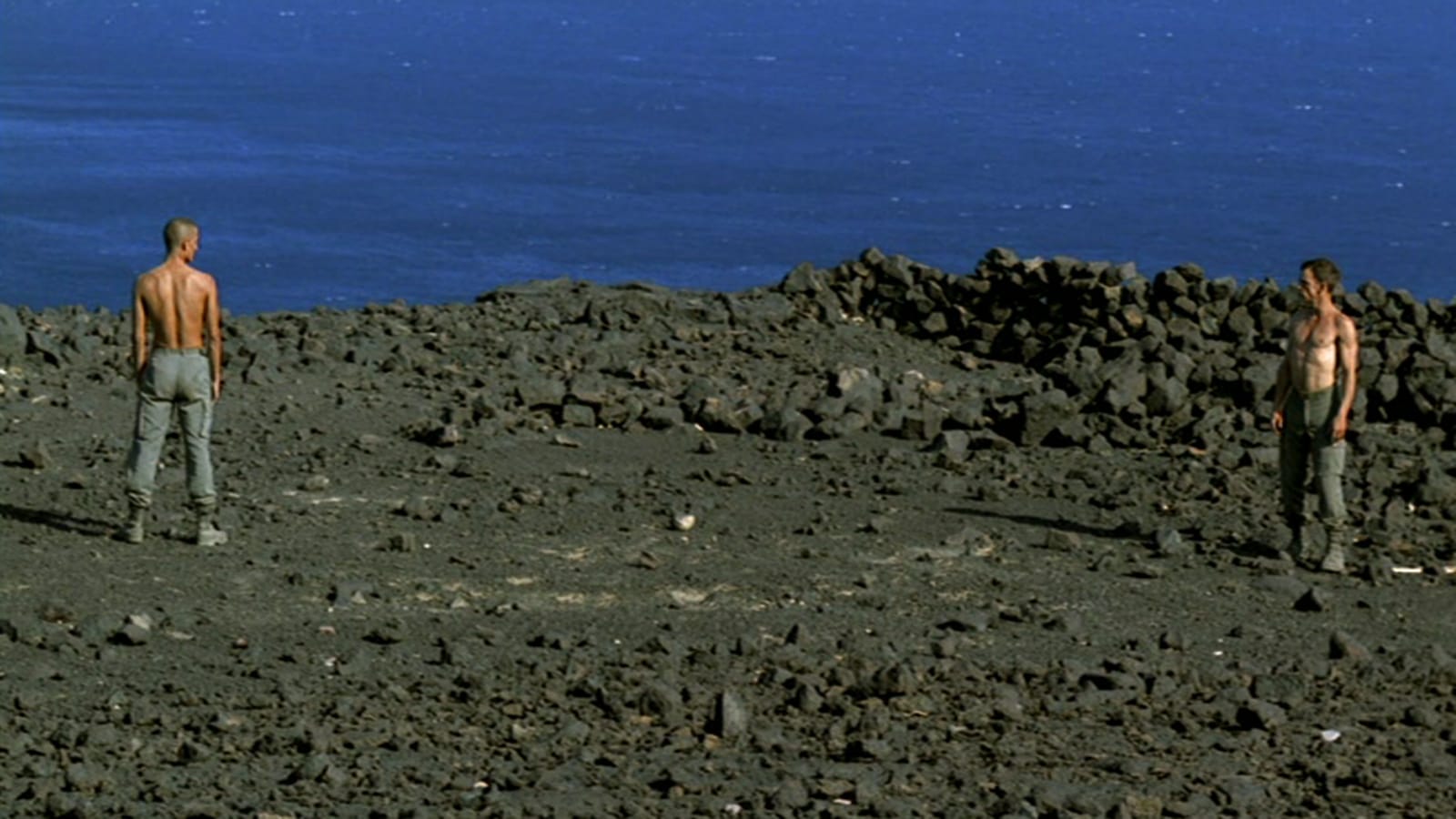
Criterion’s new 4K restoration of Claire Denis’ remarkable 1999 film looks absolutely gorgeous—stark, luminous, vividly colorful, and precise in every fine line and minute detail. That precision suits the film’s subject: a tightly disciplined French Foreign Legion troop under the demanding leadership of an obsessive sergeant. A loose adaptation of Herman Melville’s Billy Budd and a quasi-sequel to Jean-Luc Godard’s Le Petit Soldat (1960), the film tracks the gradual psychological unraveling of Chief Master Sergeant Galoup as he develops a jealous fixation on a new recruit, Gilles Sentain, whose beautiful face and ineffable cool make him a favorite both with the other legionnaires and with Galoup’s superior, Commander Forestier. Envy, repressed desire, and festering rage commingle in Galoup’s deteriorating mind, and the innocent Sentain suffers for it. As the film proceeds, we are inexorably drawn into the inevitable tragedy of their story, even as we revel in the startling beauty of Denis’ extraordinary vision.
Denis’ controlled, assured direction draws taut performances out of her actors and keeps her audience rapt at every moment. The film is an exercise in vigorous minimalism: No part of it is superfluous. A few words of Galoup’s voiceover narration here, a brief moment of dialogue there, and the story is adumbrated enough that we can stay with the characters through stretches of wordlessness and repetitive action (the soldiers’ rigorous training exercises, the joyless dancing of local sex workers in a nightclub). Denis Lavant’s Galoup in particular is a mesmerizing presence. A muscular knot of frustration, Lavant’s body telegraphs Galoup’s inner torment with every move, and his craggy face gradually degenerates into a tragedy-mask of miserable cruelty.
Claire Denis takes care to reveal the tensions between the indigenous Africans and the legionnaires without reducing the film to a lecture on the depredations of colonialism. Even though most of the screen time is spent with the soldiers, a few crucial scenes succinctly and piercingly reveal the cost of their presence in Africa. Locals glare powerlessly as a transport of legionnaires passes by, a painfully thin goat herder with a tiny flock moves through a shot, and young African women make a grim living selling sex. Denis quietly shows us the irony of her drama: While the handful of European legionnaires at the center of the film are fully and exclusively absorbed in their own personal catastrophes, the young women who surround them are engulfed in unacknowledged misery, being functionally enslaved to the legionnaires. (“Do you know how much a colored girl costs around here?” asks one legionnaire of another, his word choice pitilessly revealing the exact nature of the relationship of his group to theirs.)
As unsparing as it is in its depictions of pain, one of the film’s great pleasures derives from the disciplined, attentive cinematography of Denis’ frequent collaborator, the great Agnés Godard. Through her lens, the astonishingly clear blue-green waters off the horn of Africa shimmer gloriously, and the skin of the legionnaires glows. The landscape swings from desolate bleakness to austere beauty, just as the legionnaires’ bodies look by turns sterile in their hardness and luminously erotic in their grace. Godard’s confidence permits her to make frequent use of a stationary camera, one that simply documents the activities under its seemingly impassive gaze. Godard never tells us what to think about her subjects. She allows their movements speak for themselves. In their training exercises, the legionnaires’ bodies are by turns animalistic, mechanistic, balletic, and absurd, while the camera merely looks on. These bodies, however, almost always look beautiful and dangerous because we see them alongside the fascinated Galoup, and this fascination, too, Godard’s camera records.
The 4K Beau Travail looks both new and familiar—new because of the perfection of Criterion’s restoration, and familiar because of the long shadow of Denis’ influence on the filmmakers of the last twenty years, particularly women filmmakers. Fans of Eliza Hittman will see in Beau Travail an obvious precursor to Beach Rats, with its lingering shots of men’s bodies as seen through the eyes of a repressed but fascinated male protagonist. Dee Rees, in her film Pariah, exactly quotes a shot of Galoup gazing out the window of a train, as her frustrated lesbian hero, posed and framed in precisely the same way as Galoup, gazes out the window of a bus. And Greta Gerwig, whose films bear few direct resemblances to this one, has nevertheless said that Beau Travail was the film that made her want to be a director. Despite these and other echoes, however, Denis’ film stands alone as a landmark film and an enduring original. It earns every moment of its audience’s attention, until its final, indelible shots.
Beau Travail is screening virtually at theaters nationwide.
